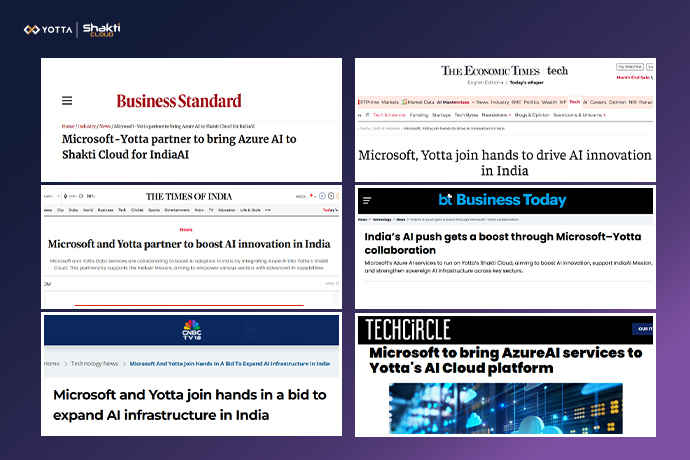- Yotta Enterprise Cloud
- Private Cloud
- Federated Cloud
- Smart Cybersecurity Solutions
- IT Management
- Yotta Power Cloud
- Compute as a Service
- Storage as a Service
- Back up & Recovery
- Disaster Recovery as a Service
- Software as a Service
- Platform as a Service
- Explore Cloud
Yotta's Compute as a Service is an infrastructure as a service (IaaS) that allows businesses and customers to access virtualised machines from Yotta's Uptime Institute certified TIER IV data center. This service further provides a wide selection of instance types, which is optimised to fit different workloads and use cases.
KNOW MOREWe offer a flexible, scalable, and reliable storage environment based on various storage technologies like file, block and object with guaranteed SLAs.
KNOW MOREBackup & Recovery as a service offers an end to end flexible, scalable, and reliable back-up and recovery environment for all kind of physical, virtual and application data. This solution is offered as a file-based and an image-based back-up with a combination of full and incremental back-ups.
KNOW MOREComprehensive DR solution designed to suit your enterprise business IT recovery on demand. We design customer-specific solutions using multiple combinations of methods (storage, back-up and replication etc.) and infrastructure (on-premises, private, public, hybrid cloud & hosted cloud etc.) to minimise the impact (RPO) of disruption and recover faster (RTO).
KNOW MOREMigrate your data and workloads to cloud with Yotta’s software as a service offering. Do away with the hassles and burden of maintaining on-premise hardware. Yotta SaaS comes with the pay-as-you-go model, giving you visibility and control over your IT costs.
KNOW MOREOur PaaS frees you from the application infrastructure, middleware and software licenses. Besides, all this is offered on our Tier IV Data Center that is reliable and redundant.
KNOW MORE- Private Cloud
- Explore Cloud
Designed and managed exclusively for you, Yotta private cloud services offer integrated approach across all data center services like hardware, operating system, database, shared services and more.
KNOW MORE- Federated Cloud
- Explore Cloud
Yotta's Federated Cloud service delivers a single-window cloud solution, designed for organisations that are advancing towards cloud model – whether it is Private, Public, Hybrid or Multi-cloud solution.
KNOW MORE- Smart Cybersecurity Solutions
- Explore Cloud
Yotta's comprehensive Smart Cybersecurity Solutions portfolio delivers robust protection through a multi-layered, end-to-end approach and helps businesses become cyber resilient.
KNOW MORE- IT Monitoring
- IT Administration
- IT Professional Services
- Cloud Management Service
- Explore Cloud
With Yotta’s managed IT services, your business becomes exceptionally agile, highly responsive, and easily scalable.
Our IT Admin services enable a dramatic reduction in IT operational costs while ensuring the high performance and availability of your critical business services.
KNOW MOREServices
- System Administration

- Hypervisor Administration

- Database Administration

- Network Administration

- Storage Administration

- Backup Administration

- DR Management Service

- Middleware Administration

- Application Administration

- SAP Basis Administration

- Asset and Configuration Management

We work with you to plan, design, implement and support your IT strategy, to make your future projects a success. Our experienced team helps you get the maximum out of the emerging technologies.
KNOW MOREWe work with you to manage, optimize, and secure your cloud infrastructure—ensuring it aligns with your business goals and scales with your growth. Our experienced team helps you harness the full potential of cloud technologies, so your operations run smoothly, and your future initiatives are built on a solid foundation.
KNOW MORE- Yotta Power Cloud
- Explore Cloud
Yotta, in collaboration with IBM Power Systems, delivers a next-generation cloud infrastructure - Yotta Power Cloud - for your enterprise's critical workloads, while building a platform that also supports emerging technologies.
KNOW MORE- Hosted Network Services
- Managed WAN Services






 Back
Back








